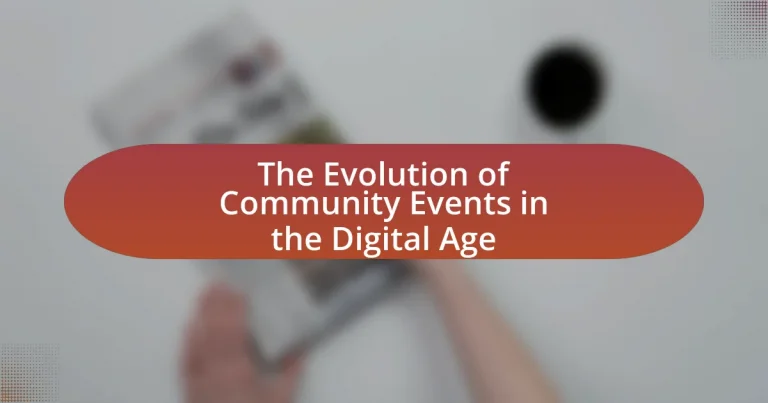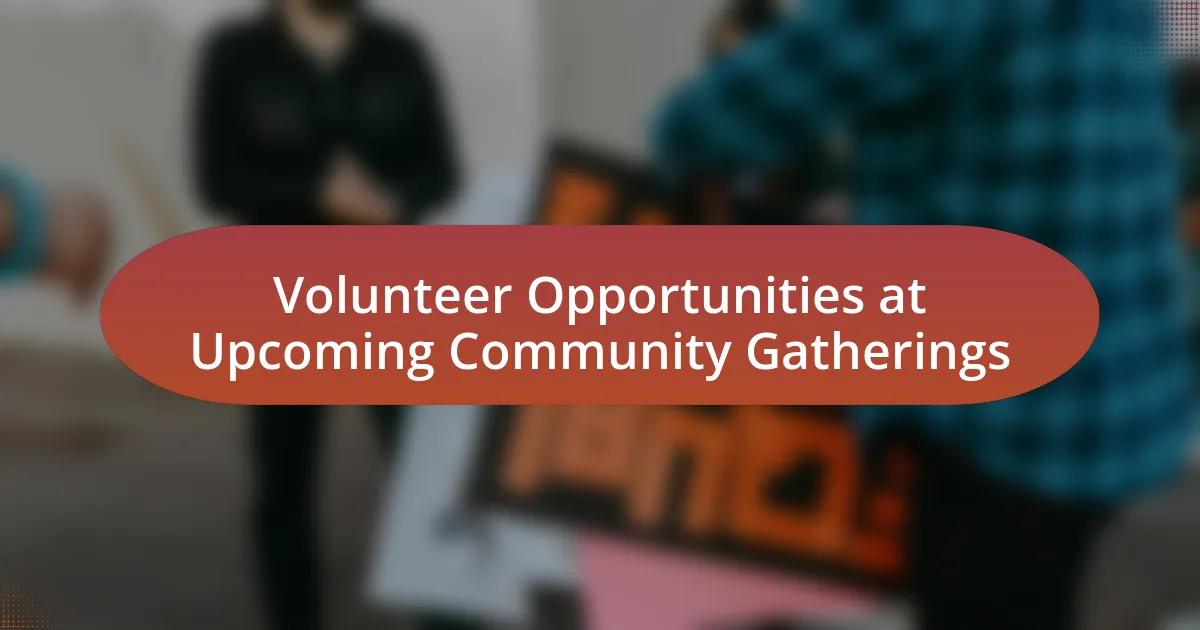Community events in the digital age are gatherings that utilize online platforms and technologies to enhance social interaction and engagement among participants. The article explores the evolution of these events, highlighting how advancements in technology, such as social media and live streaming, have transformed traditional gatherings into more inclusive and accessible experiences. It discusses the importance of community events for social cohesion, local economies, and civic participation, while also examining the challenges and best practices for organizing both virtual and hybrid events. Key insights include the role of digital tools in promoting engagement and the necessity for inclusivity in event planning.
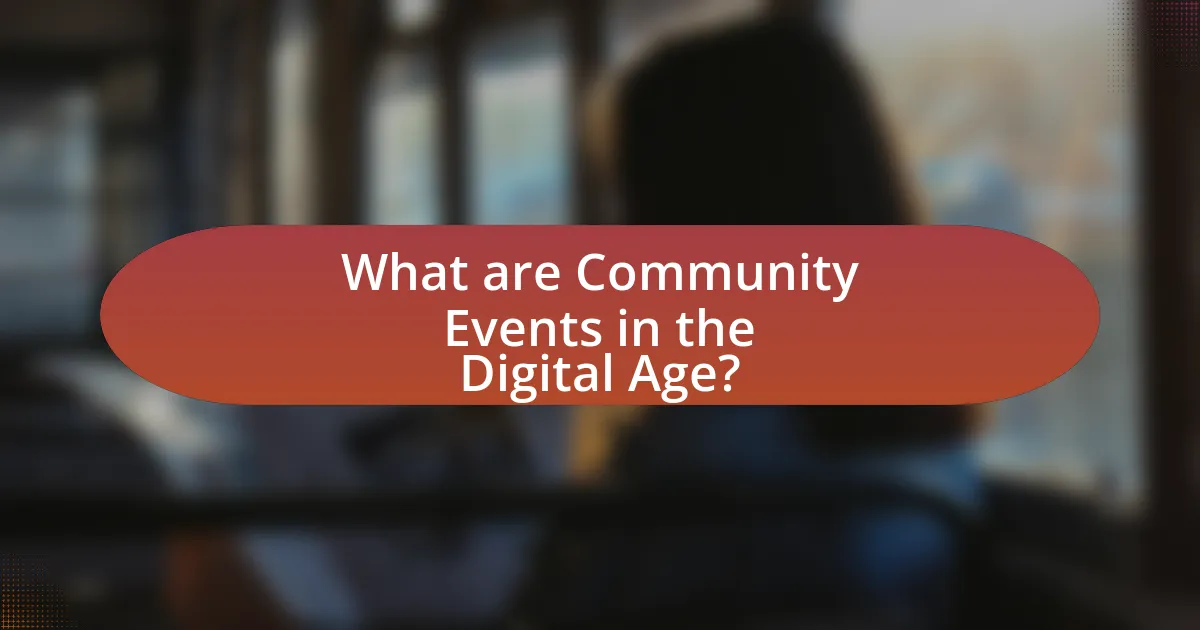
What are Community Events in the Digital Age?
Community events in the digital age are gatherings or activities that leverage online platforms and technologies to foster social interaction, collaboration, and engagement among participants. These events can range from virtual meetups and webinars to online festivals and social media campaigns, enabling communities to connect regardless of geographical barriers. The rise of digital tools has transformed traditional community events by allowing for broader participation, real-time interaction, and the ability to share resources and information instantly. For instance, during the COVID-19 pandemic, many local communities shifted to virtual events, demonstrating the adaptability and resilience of community engagement in the digital landscape.
How have community events evolved with technology?
Community events have evolved significantly with technology by integrating digital platforms for organization, promotion, and participation. The rise of social media and event management software has enabled organizers to reach larger audiences, streamline registration processes, and enhance engagement through real-time updates. For instance, platforms like Facebook Events and Eventbrite allow for easy sharing and RSVP tracking, which increases attendance rates. Additionally, virtual events have emerged, especially during the COVID-19 pandemic, allowing communities to connect remotely through webinars and live streams, thus expanding accessibility beyond geographical limitations. This shift demonstrates how technology has transformed traditional community gatherings into more inclusive and interactive experiences.
What technological advancements have influenced community events?
Technological advancements such as social media, mobile applications, and live streaming have significantly influenced community events. Social media platforms like Facebook and Instagram enable event promotion and engagement, allowing organizers to reach larger audiences and facilitate real-time interaction. Mobile applications streamline event management by providing features for ticketing, scheduling, and attendee networking, enhancing the overall experience. Live streaming technology allows events to reach remote participants, expanding accessibility and participation beyond geographical limitations. According to a report by Eventbrite, 70% of event organizers believe that social media is crucial for event success, highlighting its impact on community engagement and attendance.
How do digital platforms facilitate community engagement?
Digital platforms facilitate community engagement by providing accessible spaces for interaction, collaboration, and information sharing among community members. These platforms, such as social media, forums, and community websites, enable users to connect regardless of geographical barriers, fostering a sense of belonging and participation. For instance, a study by the Pew Research Center found that 69% of adults in the U.S. use social media, which serves as a primary tool for community organizing and mobilization. Additionally, features like event creation, polls, and discussion threads on these platforms allow for real-time feedback and collective decision-making, enhancing community involvement and responsiveness.
Why are community events important in today’s society?
Community events are important in today’s society because they foster social connections and enhance community cohesion. These gatherings provide opportunities for individuals to engage with one another, share experiences, and build relationships, which are essential for a supportive social network. Research indicates that communities with strong social ties experience lower crime rates and improved mental health outcomes, as highlighted in a study by the National Institute of Mental Health, which found that social support significantly reduces stress and promotes well-being. Furthermore, community events often encourage civic participation and volunteerism, leading to increased community investment and a sense of belonging among residents.
What role do community events play in social cohesion?
Community events play a crucial role in fostering social cohesion by bringing individuals together, facilitating interactions, and building relationships within a community. These events create opportunities for diverse groups to engage, share experiences, and collaborate, which strengthens community bonds. Research indicates that participation in community events enhances feelings of belonging and trust among residents, leading to a more unified social fabric. For instance, a study published in the Journal of Community Psychology found that neighborhoods with regular community events reported higher levels of social capital and lower crime rates, demonstrating the positive impact of such gatherings on community well-being.
How do community events support local economies?
Community events support local economies by driving consumer spending and fostering local business engagement. These events attract visitors who spend money on food, merchandise, and services, which directly benefits local businesses. For instance, a study by the National Endowment for the Arts found that community festivals can generate significant economic impact, with some events bringing in over $1 million in revenue for local economies. Additionally, community events create job opportunities, as they often require staffing for logistics, security, and vendor management, further stimulating economic growth.
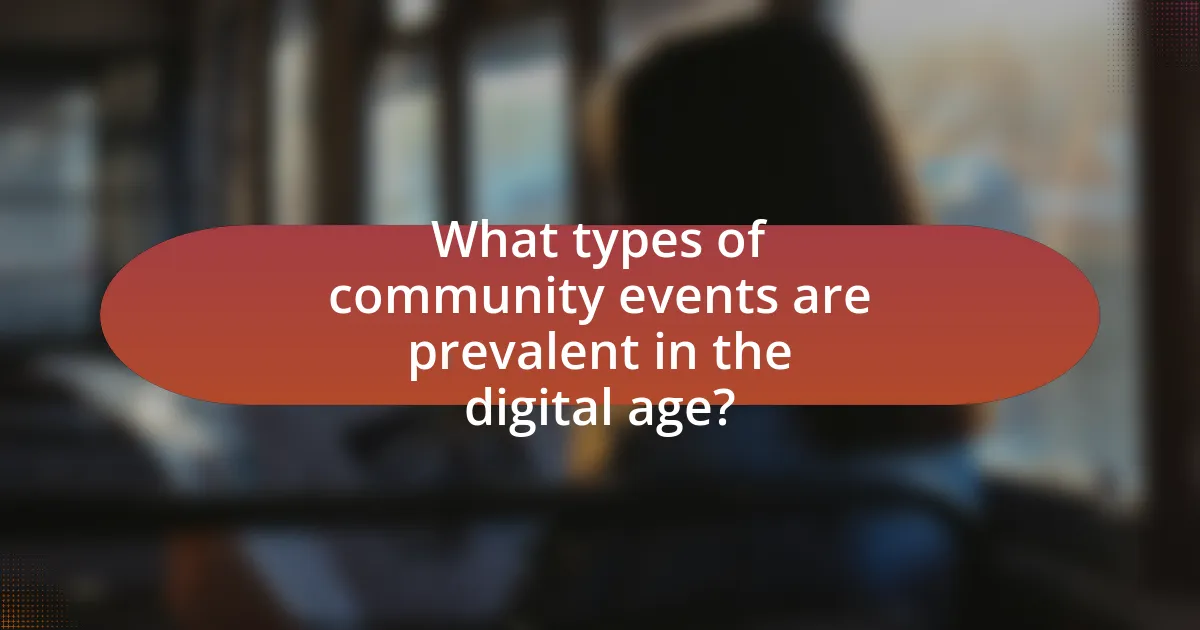
What types of community events are prevalent in the digital age?
Community events prevalent in the digital age include virtual meetups, online workshops, social media campaigns, and live-streamed performances. These events leverage technology to connect individuals across geographical boundaries, allowing for greater participation and engagement. For instance, platforms like Zoom and Facebook Live facilitate virtual gatherings, enabling communities to host events that were previously limited to physical locations. According to a report by Eventbrite, 70% of event organizers have shifted to virtual formats since the onset of the pandemic, highlighting the significant trend towards digital community engagement.
How do virtual events differ from traditional events?
Virtual events differ from traditional events primarily in their format and accessibility. Traditional events typically occur in physical locations, requiring attendees to travel, while virtual events take place online, allowing participants to join from anywhere with an internet connection. This shift to a digital platform has been accelerated by advancements in technology, enabling features such as live streaming, interactive sessions, and real-time engagement through chat and polls. According to a report by Eventbrite, 67% of event organizers believe that virtual events can reach a broader audience compared to in-person gatherings, highlighting the increased accessibility and potential for greater participation in virtual formats.
What are the benefits of hosting virtual community events?
Hosting virtual community events enhances accessibility, allowing participants from diverse geographical locations to engage without travel barriers. This inclusivity leads to increased attendance and participation, as evidenced by a report from Eventbrite which found that virtual events can attract up to 10 times more attendees compared to in-person gatherings. Additionally, virtual events often reduce costs for both organizers and participants, as expenses related to venue rental and travel are eliminated. Furthermore, they provide opportunities for innovative engagement through interactive tools like polls and breakout rooms, fostering a sense of community despite physical distance.
What challenges do organizers face with virtual events?
Organizers face several challenges with virtual events, including technical issues, participant engagement, and platform selection. Technical issues such as connectivity problems and software glitches can disrupt the event experience, leading to frustration among attendees. Additionally, maintaining participant engagement is difficult in a virtual setting, as distractions at home can lead to lower attention spans. Furthermore, selecting the right platform that meets the needs of the event and its audience is crucial; a mismatch can result in poor user experience and reduced attendance. These challenges highlight the complexities of organizing successful virtual events in the digital age.
What are hybrid events and how do they function?
Hybrid events are gatherings that combine in-person and virtual elements, allowing participants to engage both physically and digitally. These events function by integrating live presentations or activities with online streaming, enabling remote attendees to participate in real-time through video conferencing tools and interactive platforms. This format enhances accessibility, as it accommodates a broader audience regardless of geographical limitations, and it has gained popularity due to advancements in technology and the increasing demand for flexible participation options.
What technologies are essential for successful hybrid events?
Essential technologies for successful hybrid events include high-quality video conferencing platforms, reliable internet connectivity, event management software, and audience engagement tools. Video conferencing platforms like Zoom or Microsoft Teams enable seamless interaction between in-person and virtual attendees, ensuring that all participants can engage effectively. Reliable internet connectivity is crucial to support streaming and real-time communication without interruptions. Event management software, such as Whova or Eventbrite, helps organizers manage registrations, schedules, and attendee interactions efficiently. Audience engagement tools, including live polling and Q&A features, enhance participation and interaction, making the event more dynamic. These technologies collectively ensure that hybrid events are inclusive, interactive, and successful.
How do hybrid events enhance participation?
Hybrid events enhance participation by combining in-person and virtual elements, allowing a broader audience to engage. This dual format increases accessibility, as individuals who may not be able to attend physically due to geographical, financial, or time constraints can still participate online. Research indicates that hybrid events can increase attendance by up to 30% compared to traditional in-person events, as they cater to diverse preferences and circumstances. Additionally, interactive features such as live polls, Q&A sessions, and networking opportunities in virtual platforms further encourage engagement from remote participants, making the overall experience more inclusive and dynamic.
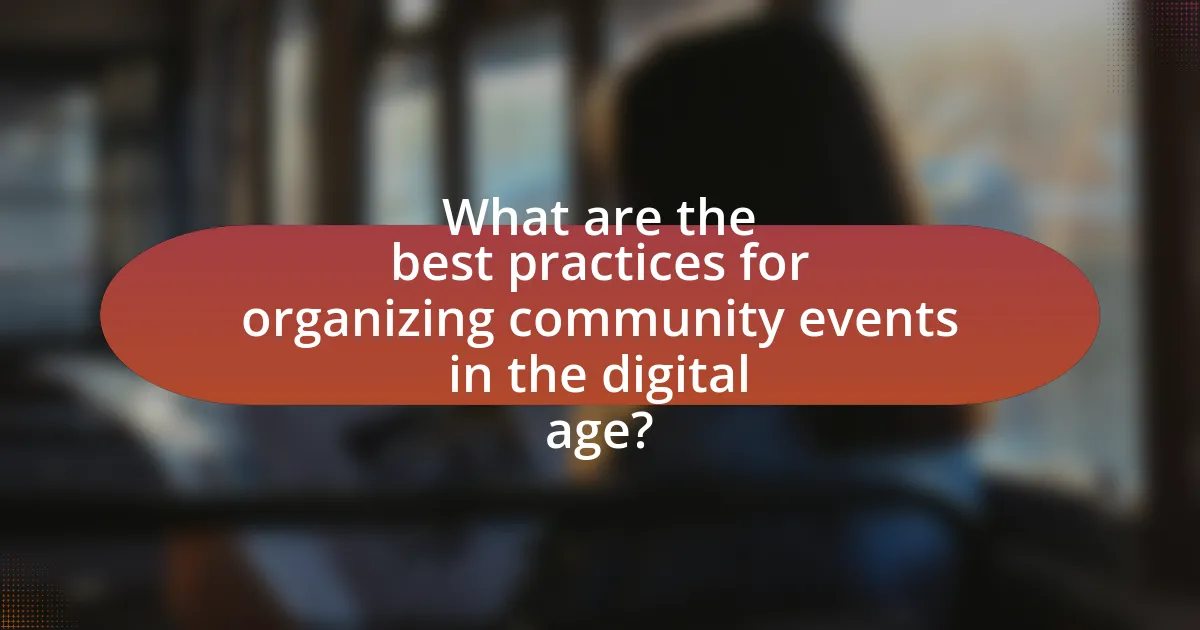
What are the best practices for organizing community events in the digital age?
The best practices for organizing community events in the digital age include leveraging social media for promotion, utilizing online registration tools, and fostering community engagement through interactive platforms. Social media platforms like Facebook and Instagram allow organizers to reach a wider audience quickly, with 54% of event organizers reporting increased attendance through social media marketing. Online registration tools streamline the sign-up process, making it easier for participants to join, which can lead to higher turnout rates. Additionally, interactive platforms such as Zoom or Discord facilitate real-time engagement, allowing for a more dynamic and inclusive experience. These practices are supported by data indicating that events utilizing digital tools see a 30% increase in participant satisfaction and engagement.
How can organizers effectively promote community events online?
Organizers can effectively promote community events online by utilizing social media platforms, email marketing, and community engagement strategies. Social media platforms like Facebook, Instagram, and Twitter allow organizers to reach a broad audience quickly; for instance, Facebook events can generate significant interest, with over 500 million users engaging with events each month. Email marketing enables direct communication with interested individuals, allowing for personalized outreach and reminders, which can increase attendance rates by up to 20%. Additionally, engaging with local influencers and community groups can amplify reach and credibility, as studies show that community-driven promotions can lead to a 30% increase in event participation.
What social media strategies are most effective for event promotion?
Effective social media strategies for event promotion include targeted advertising, engaging content creation, and influencer partnerships. Targeted advertising allows event organizers to reach specific demographics, increasing the likelihood of attendance; for instance, Facebook Ads can be tailored to users based on interests and location, resulting in higher engagement rates. Engaging content creation, such as videos, live streams, and interactive posts, fosters community involvement and excitement around the event, as evidenced by a 2019 study from HubSpot showing that video content generates 1200% more shares than text and images combined. Additionally, collaborating with influencers who resonate with the target audience can amplify reach and credibility, as influencers often have established trust with their followers, leading to increased ticket sales and event awareness.
How can email marketing enhance community event outreach?
Email marketing can enhance community event outreach by providing a direct and personalized communication channel to engage potential attendees. This method allows organizations to segment their audience based on interests and demographics, ensuring that the content is relevant and tailored. According to a study by the Direct Marketing Association, email marketing has an average return on investment of $42 for every dollar spent, demonstrating its effectiveness in reaching and converting audiences. Additionally, email campaigns can include event details, registration links, and reminders, which streamline the process for attendees and increase participation rates.
What tools can help streamline the organization of community events?
Project management software, such as Trello and Asana, can significantly streamline the organization of community events by providing structured task management and collaboration features. These tools allow event organizers to assign tasks, set deadlines, and track progress in real-time, enhancing team coordination. For instance, a study by the Project Management Institute found that organizations using project management tools experience a 20% increase in project success rates. Additionally, event registration platforms like Eventbrite simplify attendee management by automating ticket sales and RSVPs, which reduces administrative workload and improves participant engagement.
What event management software is recommended for digital events?
For digital events, software such as Zoom, Hopin, and Eventbrite is highly recommended. Zoom is widely used for its robust video conferencing capabilities, allowing for large-scale virtual meetings and webinars. Hopin offers an all-in-one platform designed specifically for virtual events, providing features like networking, expo areas, and interactive sessions. Eventbrite is known for its ticketing and event promotion features, making it suitable for organizing and managing online events. These platforms have been adopted by numerous organizations for their effectiveness in facilitating engaging digital experiences.
How can collaboration tools improve team coordination for events?
Collaboration tools enhance team coordination for events by streamlining communication and task management. These tools facilitate real-time updates, allowing team members to share information instantly, which reduces misunderstandings and delays. For instance, platforms like Slack or Microsoft Teams enable teams to create dedicated channels for specific events, ensuring that all relevant discussions and documents are centralized. Research indicates that organizations using collaboration tools experience a 20-25% increase in productivity, as tasks are clearly assigned and tracked, leading to more efficient workflows. Additionally, features such as shared calendars and project management boards help teams visualize timelines and responsibilities, further improving coordination and accountability.
What are common pitfalls to avoid when planning community events?
Common pitfalls to avoid when planning community events include inadequate budgeting, poor communication, and lack of engagement. Inadequate budgeting can lead to overspending or insufficient funds to cover essential expenses, which can jeopardize the event’s success. Poor communication among organizers, volunteers, and participants can result in confusion and mismanagement, negatively impacting attendance and overall experience. Lack of engagement with the community can lead to low participation rates, as events that do not resonate with the audience fail to attract interest. These pitfalls are supported by research indicating that effective planning and community involvement are critical for successful event outcomes.
How can organizers ensure inclusivity in digital events?
Organizers can ensure inclusivity in digital events by implementing accessible technology and providing diverse content. Accessible technology includes features such as closed captioning, screen reader compatibility, and multilingual support, which cater to individuals with disabilities and those who speak different languages. Research indicates that 15% of the global population experiences some form of disability, highlighting the necessity for such accommodations. Additionally, offering diverse content that reflects various cultural perspectives and experiences fosters a sense of belonging among participants. By prioritizing these elements, organizers can create an environment where all attendees feel valued and included.
What measures can be taken to enhance attendee engagement?
To enhance attendee engagement, event organizers can implement interactive technologies such as live polling and Q&A sessions. These tools allow attendees to actively participate in discussions, providing immediate feedback and fostering a sense of community. Research indicates that events incorporating interactive elements see a 30% increase in attendee satisfaction, as participants feel more involved and valued. Additionally, utilizing social media platforms for real-time interaction can further boost engagement, with studies showing that events promoting social sharing experience a 50% higher engagement rate.
What practical tips can enhance the success of community events in the digital age?
To enhance the success of community events in the digital age, organizers should leverage social media platforms for promotion, engage participants through interactive content, and utilize event management software for streamlined operations. Social media platforms like Facebook and Instagram can reach a wider audience, as studies show that 54% of event attendees discover events through social media. Interactive content, such as polls and live Q&A sessions, fosters engagement and builds community, which is crucial for event success. Additionally, event management software can simplify registration, ticketing, and communication, improving the overall attendee experience and operational efficiency.
